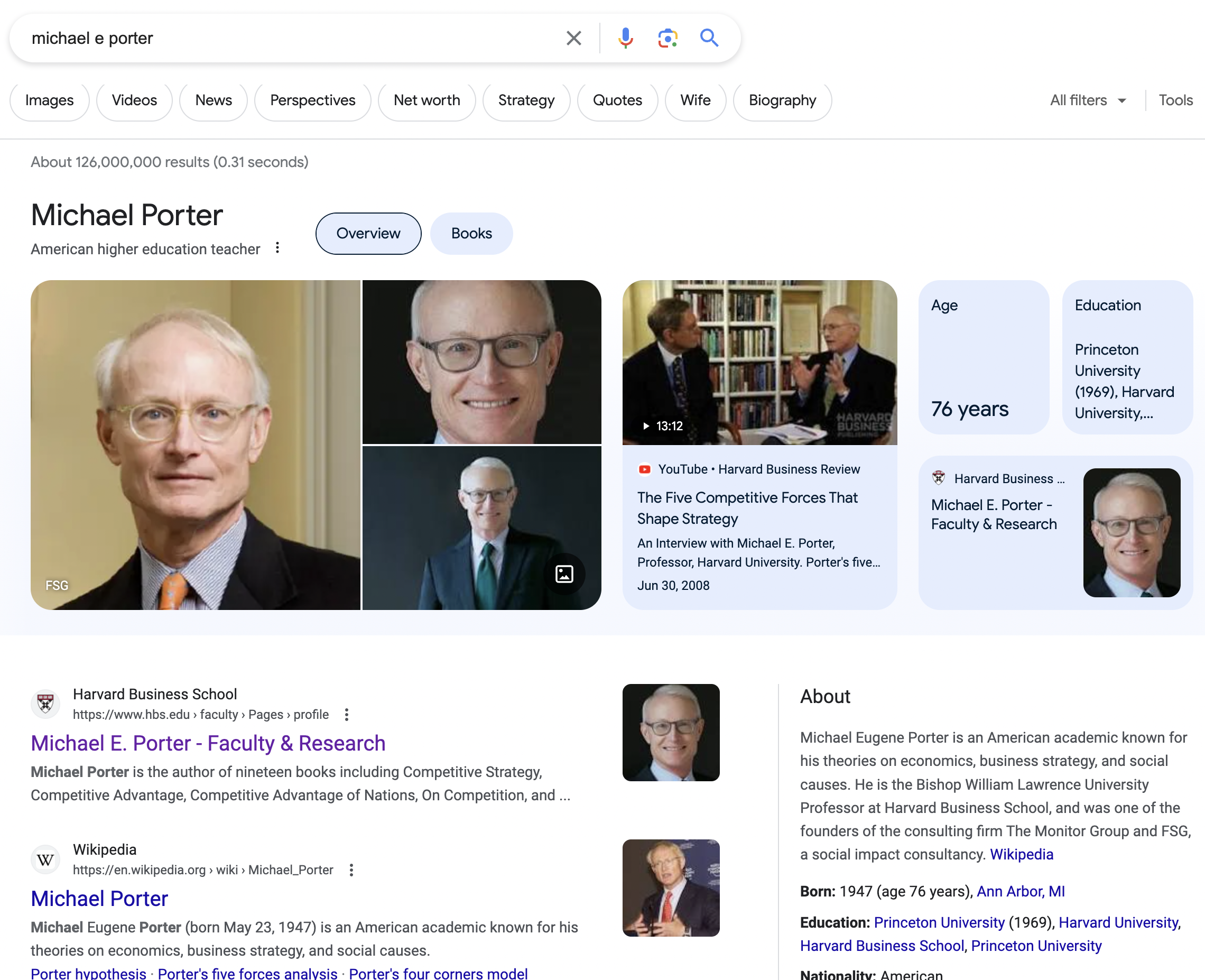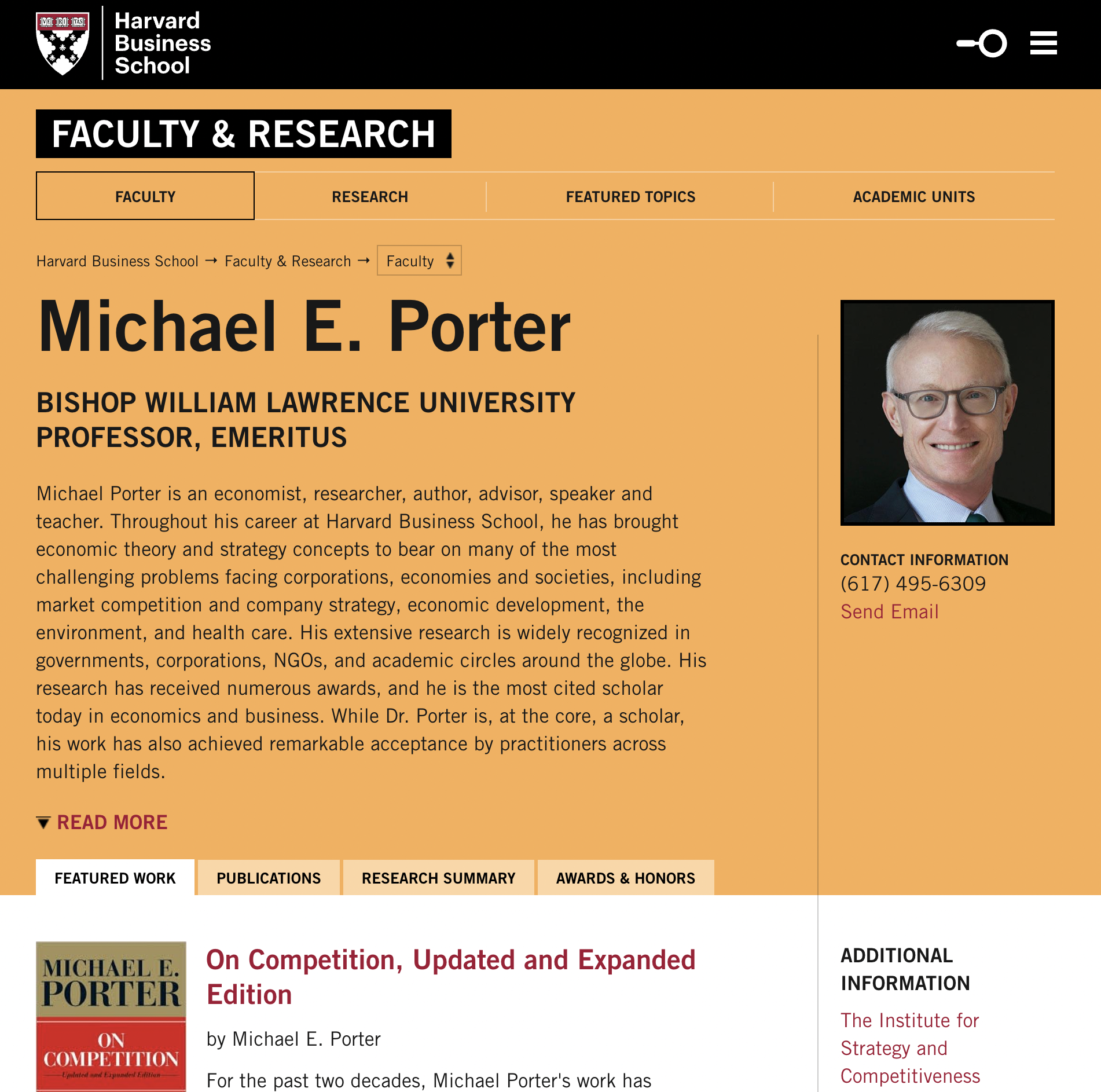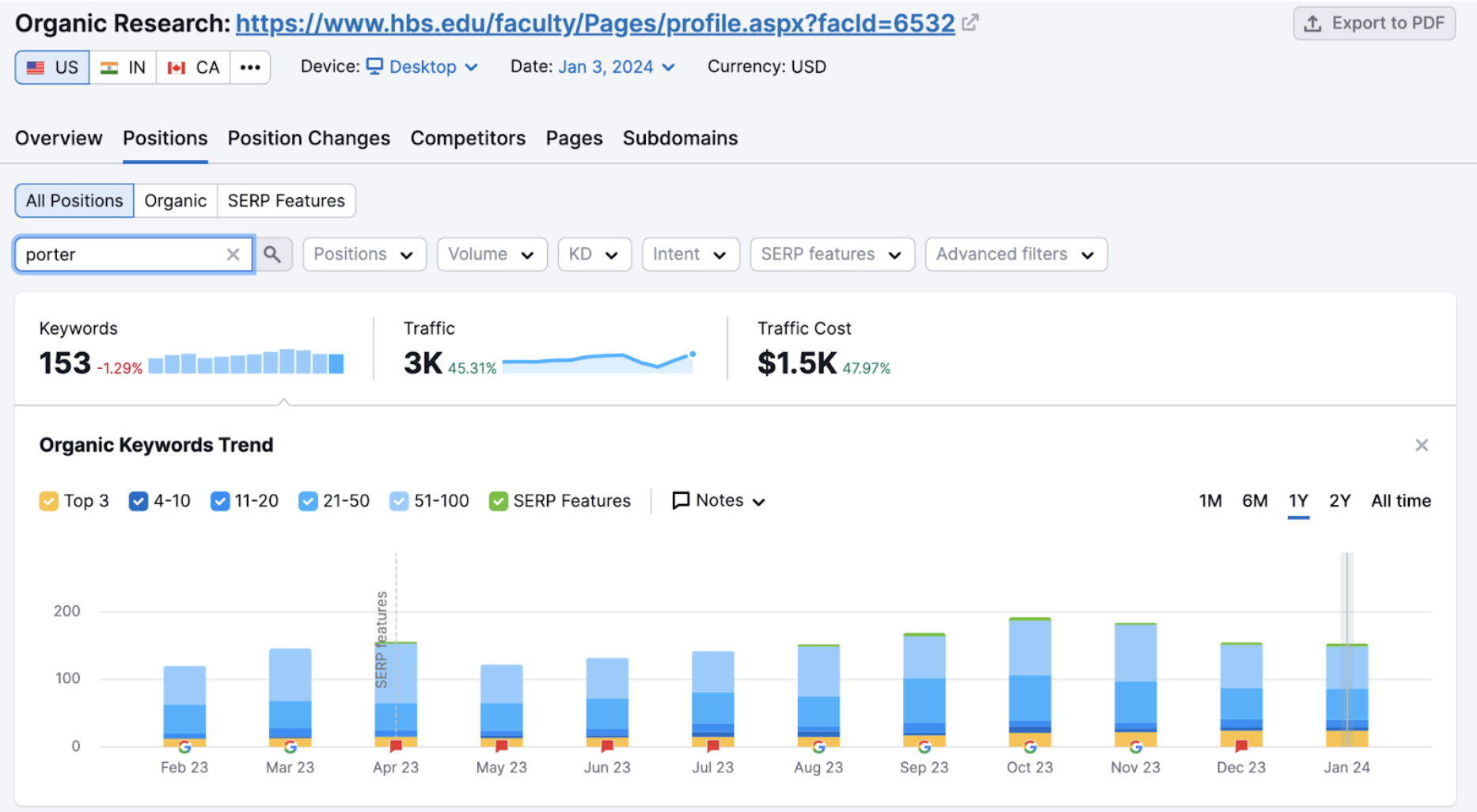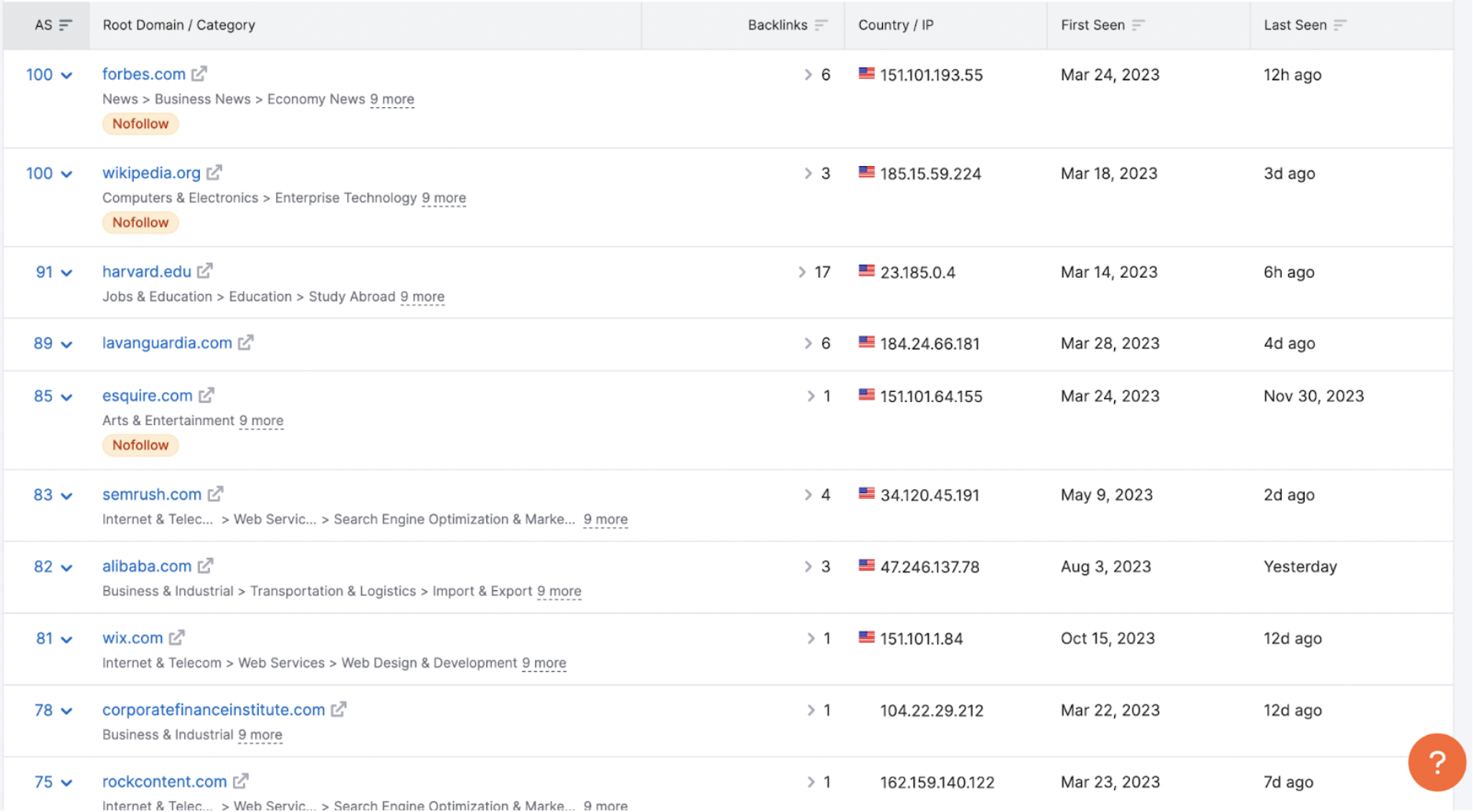Key opinion leaders (KOLs) have emerged as influential figures, bridging the gap between experts and influencers to build a site’s reputation.
In this article, I will dive into the nuances of KOLs in digital PR for SEO, underscoring their importance in building a real-world reputation that can influence ranking factors, particularly in specialized fields.
I will use my expert evaluation model to analyze Michael E. Porter, a renowned authority in competitive strategy from Harvard Business School.
Porter’s case shows how internal KOLs can shape discourse, drive brand visibility, and influence SEO ranking factors through their expertise and reputation.
This is why you should use digital PR as an alternative to link building.
Key insights from the article:
- A key opinion leader is a hybrid expert-influencer: A KOL is an expert in a field with the influence of a social media influencer.
- Utilizing shareable content: Leverage KOLs and engaging content to earn backlinks and enhance SEO rankings.
- Earn links and brand search volume: KOLs can write guest articles to earn backlinks and increase brand search volume simultaneously.
- Valuable research studies: Disseminating breakthrough research through KOLs boosts their reputation and establishes them as industry thought leaders.
Let’s begin.
Subject Matter Experts Vs. Influencers
According to Merriam-Webster, an influencer is:
“a person who is able to generate interest in something (such as a consumer product) by posting about it on social media.”
An expert is defined differently as “having, involving, or displaying special skill or knowledge derived from training or experience.”
An influencer may not drive long-term buying decisions but might influence short-term actions or tests. In contrast, an expert influences decisions and actions of important or complex decisions.
The third option is a key opinion leader, which is a hybrid expert & influencer. A KOL has both influence and expert experience in a given field.
If these outcomes are your focus, then keep reading to understand more about KOLs.
What Is A Key Opinion Leader (KOL)?
A key opinion leader is an expert who influences complex and high-value decisions due to their expertise from real-world experiences in a given field.
A KOL typically has a senior role in a company or agency where they actively work in their field.
KOLs influence important decisions and actions in Your Money or Your Life (YMYL) or other complex purchasing decisions.
In my SEJ article, How To Uncover Your Expertise To Become A Journalist’s Source, I provide a not-so-simple expert-evaluation framework for identifying the degree to which an individual is an expert in a specific field.
My expert evaluation model has four key areas.
- Proven expert knowledge: Depth of knowledge from experience & practice with a demonstration of skill.
- Develop influential assets: Develop publications & research that lead to reputation & recognition of influencing other experts.
- Evolving with change: Adapting to feedback from continuous learning that leads to innovative contributions in their field.
- Improve by teaching: Demonstrating problem-solving and communication skills by teaching, mentorship, and consultation.
Use this model to pitch a KOL to the media as an expert source in a specific field.
The next section explains how to use KOLs in SEO and digital PR to impact Google search positively.
3 Ways To Use KOLs In Digital PR For SEO
KOLs are a digital PR alternative to link building. This alternative can help improve the reputation of a site, its content, and the individual or entity behind it.
Digital PR is an alternative to link building because, although certain attributes of backlinks are most certainly ranking factors, the site’s reputation is a broader list of factors.
How the audience engages with a site’s content contributes to this reputation. This engagement can include:
- Sharing and linking to content.
- Mentioning the brand or product and the individuals behind it.
- Searching brands or concepts on Google.
- Using insights from experts to make purchasing decisions (manifests in reviews or shares).
- Integrating insights from an expert’s content to influence writing.
Although an op-ed or guest contributor post from these experts doesn’t directly influence ranking, an expert who is clever can generate ranking signals due to the impact on an audience.
These signals can include the audience taking action like:
- Searching the brand’s name or concepts in Google.
- Linking to or mentioning the brand.
- Returning to a website or a specific article.
- Discussing the brand.
Generating these signals requires more than an article; it also needs an understanding of the audience’s and media’s trending interests.
From a trend analysis, use the article to share linkable and shareable content assets. An effective article could function as:
- A source of unique research.
- A way to distribute unique content assets in a relevant community.
- Explain research in op-eds or guest contributor articles.
Pro Tips
- With digital PR, you might not need any blog content as the reputation of the content can be separate from the reputation of the product or company.
- Sometimes, media trends don’t align with customer interests. This is, unfortunately, a frequent issue. Try to find trends that align with customer and media trends, not just the media.
Let’s examine a key opinion leader whose concepts have influenced my content creation and decision-making, Michael E. Porter.
The Case Of Michael E. Porter
Michael Porter is a leader in competitive strategy and professor emeritus at Harvard University. He’s an economist, researcher, author, advisor, speaker, and teacher.
 Screenshot of search for [michael e porter], Google, January 2024
Screenshot of search for [michael e porter], Google, January 2024I created an expert evaluation model to identify the attributes and the degree to which a person is an expert. Porter has strong attributes in every aspect of my expert evaluation model.
Proven Expert Knowledge
He has deep knowledge of competitive strategy from extensive research.
His study on competitive strategy in the 1990s is foundational research that explains what constitutes competitive strategy.
Porter wrote about the study in a popular article in the Harvard Business Review called What is Strategy? in 1996.
He went on to perform research in cluster & competition about how competition clusters to a specific geographic region. This is just a sample of his research.
Porter built off his research to demonstrate experience & practice by founding Monitor Deloitte, a business strategy consultancy for senior management of large organizations and government bodies.
The next attribute to evaluate is building influential assets.
Develop Influential Assets
His research and books have driven the strategy for industry and nations. He has written books about competitive strategy based on his early and new research.
These assets have led him to receive numerous awards and honors, like the 2018 McKinsey Award for the best article in Harvard Business Review for How CEOs Manage Time.
Another piece by Porter called The Five Forces that Shape Strategy in Harvard Business Review became a competitive strategy model called Porter’s Five Forces, now a model taught in universities and frequently written about in business training.
50minutes.com even created a pocketbook that summarizes Porter’s Five Forces.
Evolving With Change
He has adapted to feedback from continuous learning that leads to innovative contributions in their field.
Although starting his research in the late 1970s, he has continued to contribute to more recent topics like augmented reality.
Improve By Teaching
Porter demonstrates problem-solving and communication skills through teaching, mentorship, and consultation.
Porter has taught others his research and has continually written about it, which clearly communicates his thought process.
These are the reasons why he’s become a powerful key opinion leader.
If Porter recommends your business or ideas, expect them to influence decisions and the results.
Let’s examine the value he has created for Harvard as a professor and contributor from an SEO perspective. I’ll use Semrush for this examination.
 Image from Harvard Business School, January 2024
Image from Harvard Business School, January 2024Brand Search
Porter’s faculty profile on the Harvard Business School appears for over 153 search variations of the name “Michael Porter” in January 2024.
 Screenshot from Semrush, January 2024
Screenshot from Semrush, January 2024Hbs.edu benefits from this brand search in several ways:
- Expert reputation with Google: The brand search contributes to the reputation of the domain in Google.
- Connection to “business strategy”: Search engines see the website as more relevant to education and business topics, so the course pages can rank more easily.
- Improve school brand search: Students will search the school with the brand name “Harvard Business School” at various stages of the customer journey – thus further improving the website’s reputation with the search engines.
Google representatives have consistently stated that the expertise and reputation of the individuals and entities behind the website are key factors in ranking.
A strong signal of a site’s reputation is the search for brand names of the individuals and entities behind it.
The keyword “Michael Porter” has 12,100 average monthly searches as of the date of this article.
Links And Traffic
Porter’s page and other faculty KOLs drive the site’s reputation with links and traffic.
561 unique referring domains link to Michael’s faculty page on hbs.edu.
Although this is a small fraction of the total 28,700 referring domains, many of the professors at Harvard Business School are KOLs and contribute to the reputation of the school’s reputation.
Furthermore, according to Semrush, Porter’s page has a highly relevant link profile with placements on Forbes, Semrush, and Alibaba referencing his work.
-
 Screenshots from Semrush, January 2024
Screenshots from Semrush, January 2024
Overall, the SEO for hbs.edu is terrible since Harvard relies on brand over search for recruitment. But that’s another article.
Wrapping This Up
It’s clear that key opinion leaders like Michael E. Porter aren’t just experts in their fields – they’re game-changers.
Porter’s work at Harvard Business School is a great example of how a KOL can blend deep knowledge, research, and contribution with expert op-eds or guest articles to improve SEO.
This article is a call to action for anyone looking to make a real impact in their field and improve the value of search engines as a key marketing channel.
More resources:
Featured Image: Gearstd/Shutterstock
 seolounge
seolounge

